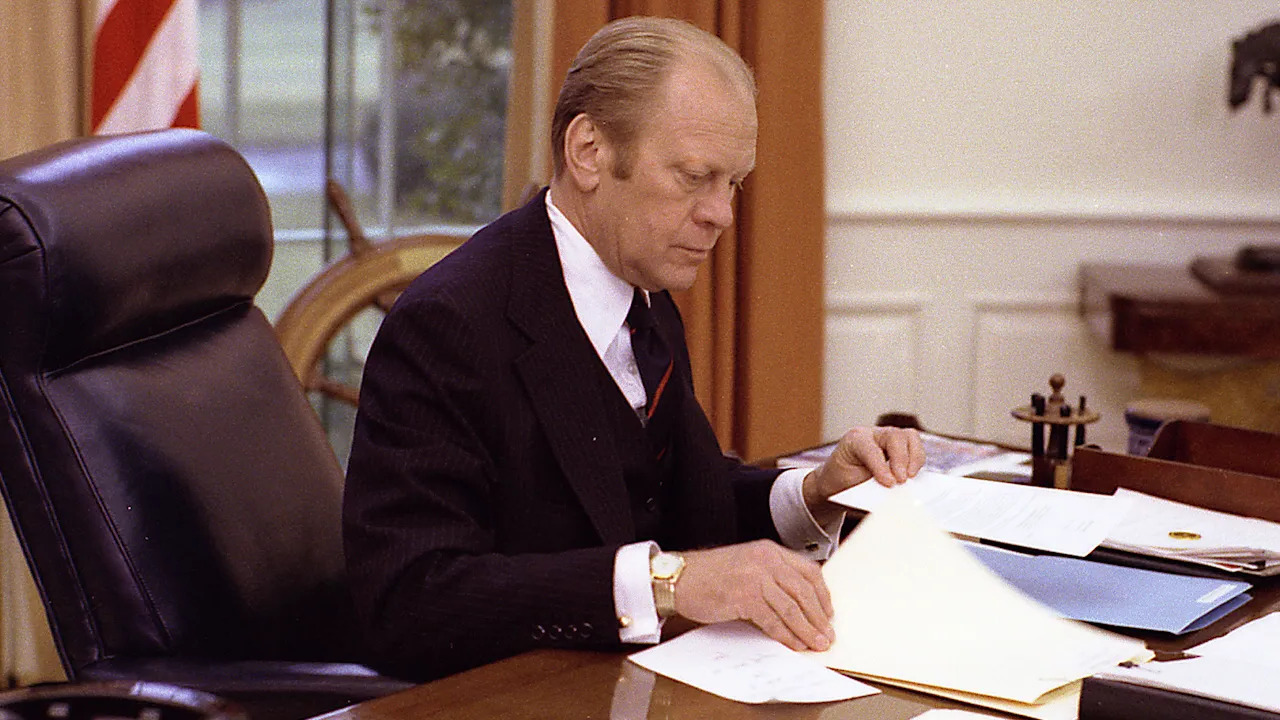
Gerald Ford, the 38th President of the United States, holds a unique place in American history. Did you know he is the only person to have served as both Vice President and President without being elected to either office? Ford's presidency, which lasted from 1974 to 1977, followed the resignation of Richard Nixon amid the Watergate scandal. Born Leslie Lynch King Jr., he was renamed after his stepfather. Ford was a star athlete at the University of Michigan, where he played football. His time in office was marked by efforts to heal a nation divided by scandal and war. From his early life to his post-presidential years, Ford's story is filled with intriguing details that reveal much about his character and leadership. Ready to learn more? Here are 25 fascinating facts about Gerald Ford.
Early Life and Education
Gerald Ford, the 38th President of the United States, had an interesting journey before reaching the Oval Office. Let's dive into some fascinating facts about his early years.
-
Born Leslie Lynch King Jr. on July 14, 1913, in Omaha, Nebraska, Ford's name changed after his mother remarried.
-
Ford's stepfather, Gerald Rudolff Ford, adopted him, and he took his stepfather's name.
-
He grew up in Grand Rapids, Michigan, where he excelled in academics and sports.
-
Ford attended the University of Michigan, where he played center on the football team and helped them win national championships in 1932 and 1933.
-
After graduating in 1935, Ford turned down offers to play professional football to attend Yale Law School.
Military Service
Ford's commitment to his country extended beyond politics. His military service during World War II is a testament to his dedication.
-
Ford enlisted in the U.S. Navy in April 1942, shortly after the attack on Pearl Harbor.
-
He served on the USS Monterey, an aircraft carrier, where he saw action in the Pacific Theater.
-
Ford's ship survived a typhoon in 1944, which he later described as one of the most harrowing experiences of his life.
-
By the end of the war, Ford had achieved the rank of lieutenant commander.
Political Career
Ford's political career began long before he became president. His time in Congress and as Vice President shaped his leadership style.
-
Ford was first elected to the U.S. House of Representatives in 1948, representing Michigan's 5th congressional district.
-
He served in the House for 25 years, eventually becoming the House Minority Leader in 1965.
-
In 1973, Ford was appointed Vice President after Spiro Agnew resigned, making him the first person appointed to the vice presidency under the 25th Amendment.
-
Ford became President on August 9, 1974, following Richard Nixon's resignation amid the Watergate scandal.
Presidency
Ford's presidency was marked by significant events and decisions that continue to be discussed today.
-
One of Ford's first acts as president was to pardon Richard Nixon, a controversial decision that he believed was necessary for the nation to heal.
-
He faced economic challenges, including high inflation and unemployment, which he addressed with policies like the "Whip Inflation Now" campaign.
-
Ford survived two assassination attempts within 17 days in September 1975, both by women.
-
He signed the Helsinki Accords in 1975, which aimed to improve relations between the Communist bloc and the West.
-
Ford's administration saw the end of the Vietnam War, with the fall of Saigon in April 1975.
Post-Presidency
After leaving office, Ford remained active in public life and continued to influence American politics.
-
Ford lived longer than any other U.S. president, passing away at the age of 93 in 2006.
-
He received the Presidential Medal of Freedom in 1999, the nation's highest civilian award.
-
Ford co-authored a book, "A Time to Heal," reflecting on his presidency and the challenges he faced.
-
He served on various corporate boards and was involved in charitable activities, including the Gerald R. Ford Presidential Foundation.
-
Ford's legacy includes the Gerald R. Ford Presidential Library and Museum in Ann Arbor and Grand Rapids, Michigan.
Personal Life
Ford's personal life was as remarkable as his public career, filled with love, family, and personal achievements.
Ford's Legacy in a Nutshell
Gerald Ford's presidency, though brief, left a lasting impact on American history. From his unexpected rise to the Oval Office to his controversial pardon of Richard Nixon, Ford navigated turbulent times with a steady hand. His efforts to heal a divided nation and restore trust in government were commendable. Ford's background as a college football star, World War II veteran, and long-serving congressman shaped his pragmatic approach to leadership. He championed policies that aimed to curb inflation and promote economic stability. Despite facing criticism and challenges, Ford's integrity and dedication to public service remain noteworthy. His legacy serves as a reminder of the importance of resilience and honesty in leadership. Whether you're a history buff or just curious about past presidents, Ford's story offers valuable lessons on navigating political and personal challenges with grace.
Was this page helpful?
Our commitment to delivering trustworthy and engaging content is at the heart of what we do. Each fact on our site is contributed by real users like you, bringing a wealth of diverse insights and information. To ensure the highest standards of accuracy and reliability, our dedicated editors meticulously review each submission. This process guarantees that the facts we share are not only fascinating but also credible. Trust in our commitment to quality and authenticity as you explore and learn with us.


